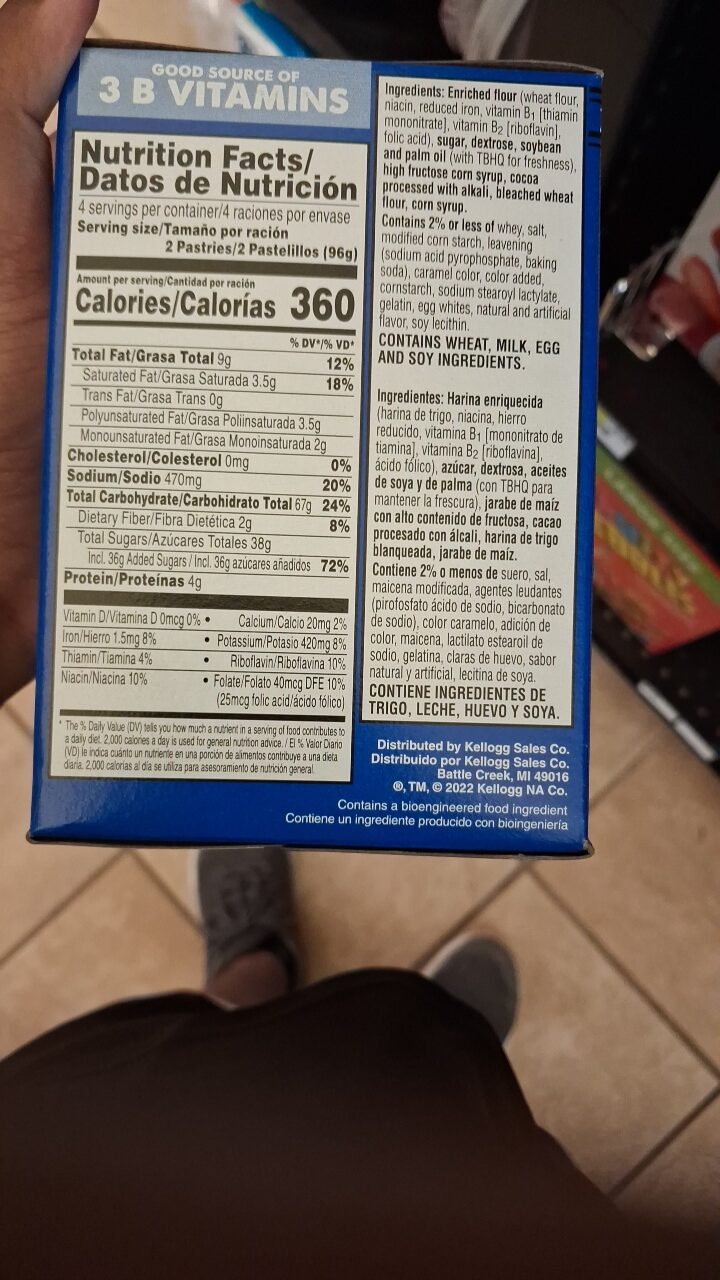
Barcode: ]C1038000222450
None
DOUBTFUL
📝 Reason: The Halal status remains indeterminate for some components. Final determination requires knowledge of exact formulations and manufacturing processes.
🏷️ Category: Baked Goods
📄 Certificates: Good Source Of 3 B Vitamins, Contains Wheat, Milk, Egg And Soy Ingredients, Contains A Bioengineered Food Ingredient, Distributed By Kellogg Sales Co., Battle Creek, Mi 49016, ®, Tm, © 2022 Kellogg Na Co.
Ingredients:
Details
Understanding the Halal Status of None
The Halal status of the product None is currently deemed doubtful. This categorization raises several questions among consumers, particularly those adhering to Islamic dietary laws. This post aims to explore the ingredients, E-numbers, and the reasons behind this uncertainty.
Ingredients Breakdown
None consists of multiple ingredients that contribute to its overall status. Let’s delve deeper into each ingredient and their individual Halal compliance:
- Enriched Flour (Wheat Flour): Permissible in Islam.
- Niacin: Permissible in Islam.
- Reduced Iron: Permissible in Islam.
- Vitamin B1 (Thiamin Mononitrate): Status needs to be verified.
- Vitamin B2 (Riboflavin): Permissible in Islam.
- Folic Acid: Permissible in Islam.
- Sugar: Permissible in Islam.
- Dextrose: Permissible in Islam.
- Soybean: Permissible in Islam.
- Palm Oil (with TBHQ for freshness): Permissible in Islam.
- High Fructose Corn Syrup: Permissible in Islam.
- Cocoa Processed with Alkali: Permissible in Islam.
- Bleached Wheat Flour: Permissible in Islam.
- Corn Syrup: Permissible in Islam.
- Whey: Permissible in Islam.
- Salt: Permissible in Islam.
- Modified Corn Starch: Permissible in Islam.
- Leavening Agents (Sodium Acid Pyrophosphate, Baking Soda): Permissible in Islam.
- Caramel Color: Permissible in Islam.
- Color Added: Status needs verification.
- Cornstarch: Permissible in Islam.
- Sodium Stearoyl Lactylate: Permissible in Islam.
- Gelatin (E441): Check for Halal Logo.
- Egg Whites: Permissible in Islam.
- Natural Flavor: Halal if no alcohol is present.
- Artificial Flavor: Permissible in Islam.
- Soy Lecithin: Permissible in Islam.
Understanding E-Numbers and Their Implications
E-numbers may raise concerns for Halal consumers as some can derive from animal sources. In None, the main concern is the presence of Gelatin (E441), which requires stringent scrutiny on its source—especially since gelatin can often come from non-Halal animals unless certified Halal. Therefore, it’s vital for consumers to look for the Halal logo when purchasing products containing E441.
What is Gelatin (E441)?
Gelatin often arises from collagen found in animal bones and skin. If sourced from Halal-certified animals, this ingredient can be permissible, but its doubtful status in None compels consumers to verify.
Conclusion: The Path to Clarity
The uncertainty surrounding None’s Halal status stems largely from a few ingredients whose verifications remain inconclusive. We encourage consumers wishing to adhere strictly to Halal dietary guidelines to approach this product with caution. For a definitive Halal status, checking the specific certifications and reading labels meticulously is a must. Products from reputable brands often come with adequate information; hence, looking out for credible certifications helps ensure your dietary choices align with your beliefs.
Final Thoughts
In conclusion, while many components of None meet Halal standards, the uncertain ingredients warrant a cautious approach. As the consumers of Halal food continue to grow in number, the demand for clarity in food labeling becomes increasingly critical. Brands that support transparency not only safeguard the interest of their customers but also foster trust in their products.
